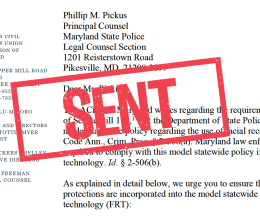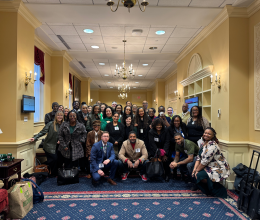
MSP Developing Model Statewide Facial Recognition Policy that Needs to Protect Marylander’s Rights
PIKESVILLE, MD – Warning Maryland law enforcement agencies against developing a statewide facial recognition policy that allows violations of Marylanders’ rights, the American Civil Liberties Union (ACLU) of Maryland today sent a letter to the Maryland State Police (MSP) detailing baseline protections that must be incorporated into the model statewide policy on facial recognition technology (FRT). Recently passed state legislation imposes some restrictions on law enforcement use of FRT, and requires that MSP “shall adopt and publish a model statewide policy regarding the use of facial recognition technology.” If they want to use FRT, Maryland law enforcement agencies will have to comply with this model statewide policy.
“Facial recognition technology in the hands of police is dangerous,” said Nate Freed Wessler, deputy director of the ACLU’s Speech, Privacy, and Technology Project. “The technology generates higher rates of false matches for Black people, People of Color, and women, and we’ve seen multiple wrongful arrests of Black people because police let false matches from the technology taint subsequent witness identifications. Plus, the threat of police using FRT to engage in pervasive tracking and surveillance is chilling. Although the best protection against abuse is to stop police from using this technology at all, there are serious steps the Maryland State Police must take now to minimize the room for abuse.”
The ACLU letter details the minimum protections necessary to safeguard Maryland residents and comply with the legislature’s mandate. These protections will also help avoid uses of FRT that may subject Maryland law enforcement agencies to legal liability for abuse of the technology.
The letter makes three main points:
- Police must be prohibited from arresting people based on a FRT result followed by a photo lineup or similar procedure, because even when FRT generates a false match it will almost always look so much like the actual suspect as to taint the reliability of the photo array.
- Facial recognition technology should not be used for surveillance of live or recorded video.
- Law enforcement agencies should not contract with private FRT matching databases containing non-consensually or illegally collected faceprints, including the abusively created database from Clearview AI.
The ACLU letter outlines the significant risks posed by facial recognition technology. The technology often generates false matches, contributing to at least seven known wrongful arrests across the country, including at least one in Maryland. Numerous studies, including from the National Institute of Standards and Technology, show that the false match rates of this technology are significantly higher when it is used to attempt to identify Black, Indigenous, and People of Color, and women. Disturbingly, nearly all of the known cases of wrongful arrests due to police reliance on incorrect FRT results have involved the arrests of Black people. In addition, the deployment of FRT technology threatens to enable mass surveillance by the government that would violate bedrock constitutional protections.
More than twenty jurisdictions across the country, from Pittsburgh, to Austin, to San Francisco, to the State of Vermont, have enacted bans on law enforcement use of FRT. The ACLU agrees that FRT is inappropriate for law enforcement use. However, since the General Assembly has allowed the use of the technology, the ACLU wrote to MSP to ensure at least these minimum protections are implemented in order to safeguard Maryland residents and comply with the legislature’s mandate.





